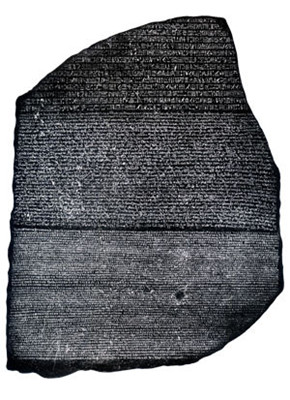What matters about the Rosetta stone is not what it says but that it says it three times and in three different languages.
但在今天,石碑的重要性并不在于它的內容,而在于它將同樣的內容用三種不同語言記錄了三遍。
In Classical Greek, the language of the Greek rulers and the state administration, and then in two forms of Ancient Egyptian-the everyday writing of the people known as Demotic, and the priestly hieroglyphics which had for centuries baffled Europeans.
其一是官方的古希臘語,另兩種則是古埃及語的兩種形式,包括人們日常生活中使用的通俗文字,以及歐洲人數百年都無法破解的祭司使用的象形文字。
It was the Rosetta Stone that changed all that; and while the text of the stone itself is pretty unexciting, it dramatically opened up the entire world of Ancient Egypt.
是羅塞塔石碑改變了一切,它戲劇性地將整個古埃及世界展現在了學者眼前。
By the time of the Rosetta Stone, 196 BC, hieroglyphs were no longer in general use, they were used and understood only by the priests in the temples.
在羅塞塔石碑制作的時期,象形文字的使用已大幅減少,只有神廟里的祭司才會用。
Five hundred years later, even this restricted knowledge of how to read and write them had disappeared-the script of Ancient Egypt was lost.
五百年后,甚至再也沒有任何人能閱讀這種文字。
The Rosetta Stone survived unread through two thousand years of further foreign occupations-Romans, Byzantines, Persians, Muslim Arabs and Ottoman Turks, all had stretches of rule in Egypt.
在接下來兩千年的異族統治時期,石碑雖然得以保存,但上面的內容始終沒人看得懂。繼希臘人之后,羅馬人、拜占庭人、波斯人、阿拉伯穆斯林以及奧斯曼土耳其人都曾統治過埃及。
At some point the stone was moved from the temple at Sais in the Nile Delta, where we think it was first erected, to el-Rashid, or the town of Rosetta as we now know it, about 40 miles away.
其間石碑從尼羅河三角洲的舍易斯神廟轉移到了四十英里外的拉希德,也就是如今的羅塞塔鎮。
Then, in 1798, Napoleon arrived. The French invasion was not only military but intellectual.
一七九八年,拿破侖進入埃及。法國的入侵當然以軍事目的為主(他們想切斷英國通往印度的道路),
With the French army came scholars.
但軍隊也帶來了許多學者。
Soldiers re-building fortifications in Rosetta dug up the stone-and the scholars knew immediately that they had found something of great significance.
士兵們在塞塔重修防御工事時挖出了石碑,隨行專家立刻斷定這是件重要的文物。












